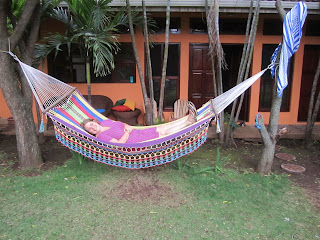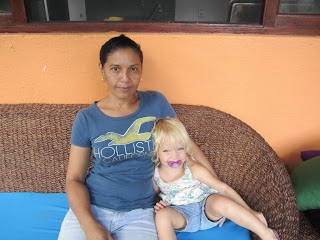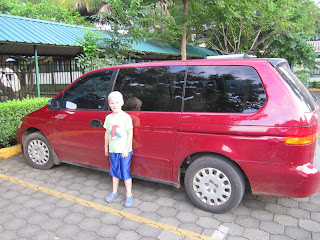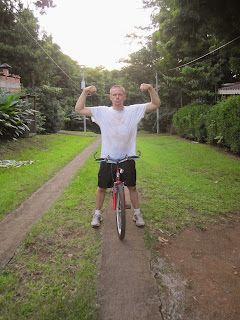After school a week or so ago, we ventured out into the country with two families in our neighborhood to a smaller town called Mateare, about 45 minutes drive from our house towards the city of Leon. On the outskirts of town is a smaller village, consisting of 6 or 7 rows of 15-20 house each, as well as a covered area used for a church, a rehab center, and a few small pulperias (stores). The entire village was constructed by Project Hope, which our neighbors help coordinate, over the last few years, and are occupied by Nicaraguan families who lost homes during a hurricane a few years ago. The homes, made of concrete bricks and wood, are tiny--think about the size of one bedroom in your own home--and most homes have at least six residents. The homes are safe and sturdy, and residents have access to clean water and electricity.
As wonderful it is for these families to be homeowners, they have very little in terms of resources and access to income, and the poverty we witnessed was difficult to see. Besides a preschool, the town has no other educational opportunities for the many children living there. If families don't have money for transportation/uniform/food, they don't send their kids into the larger town for schooling at all. There are little to no job opportunities within the village, though it is amazing how resourceful people are in terms of making enough money to survive.
We witnessed some income generation while we walked around the village. A man was there in a pick-up truck, buying peanuts dug up in a field that sits on the side of the town. Any resident can dig up the peanuts and then sell them to this man; kids had small buckets of these nuts, while some adults had multiple sacks that they were selling to this man, who was weighing the peanuts and handing out money. I'm guessing he works for a company that would then process the peanuts into sellable product. It was initially exciting to see how many people were working in the fields, gathering peanuts to sell. But then I heard that kids were getting at most 10 Córdoba for their buckets of peanuts--less than half a dollar--for a good day of work. And adults weren't getting much for their huge sacks of peanuts either--a few dollars at most a for hours of digging. That made me sad. I heard later of a woman who works in the village making hammocks, and gets next to nothing for her completed products--less than a dollar for two days of work.
 Residents of this town were friendly and excited while our family helped distribute Christmas "sacks" from Project Hope. The sacks had some food staples in them--hopefully a bit of -relief during the holiday times for these families--but certainly no long-term solution to the day-in, day-out poverty facing these families.
Residents of this town were friendly and excited while our family helped distribute Christmas "sacks" from Project Hope. The sacks had some food staples in them--hopefully a bit of -relief during the holiday times for these families--but certainly no long-term solution to the day-in, day-out poverty facing these families.It is easy to live in a place like Managua and "see" poverty without really "seeing" it. Pray for our eyes to stay open to poverty, to not become accustomed or numbed or okay with people barely making it, barely surviving. Pray for those who lack access to food, to clean water, to education and job opportunities, and pray for change in the systems that keep poor people poor. We long for human flourishing--for Shalom--here in Nicaragua--and poverty is a huge obstacle to this Biblical vision of restoration.


























































